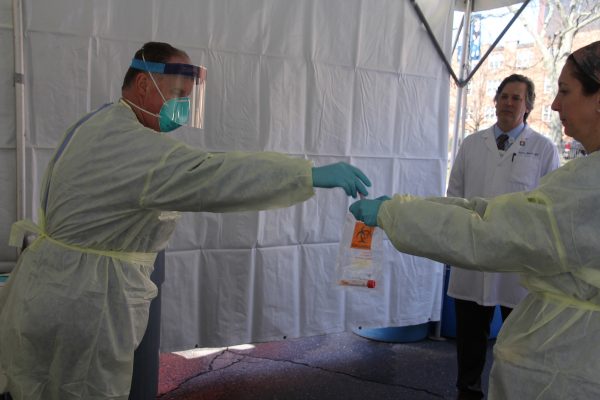Tapping a two-year research relationship with the Massachusetts Institute of Technology, Hartford HealthCare leaders announced the anticipated COVID-19 peak in Connecticut will be the end of April or beginning of May.
“If we continue social-distancing measures through the end of April, we can expect a significant decrease (in COVID-19 infection),” said Dr. Dimitris Bertsimas, associate dean of Business Analytics at MIT’s Sloan School of Management. “After that, (continued spread) depends on how society opens up and the amount of testing we do.”
Jeffrey A. Flaks, Hartford HealthCare’s president and CEO, said the system’s Center for Education, Simulation and Innovation has been working with MIT on the application of predictive modeling strategies in healthcare for several years. The MIT team creates what he called “conceptual work” and Hartford HealthCare applies it in the healthcare setting. After the COVID-19 pandemic accelerated in the United States, he said the partners pivoted to address frontline healthcare needs.
“We have 20 PhDs from around the world using our data and approaches to create potential opportunities to improve response around the world and pilot it here at HHC,” Flaks said, adding that examining decisions made at Hartford HealthCare can help “make better real-time decisions that make an impact on how we save lives.”
For example, to help healthcare officials sharpen their decision-making, the project looks at how Hartford HealthCare buys and manages personal protective equipment (PPEs) like mask and gloves, allocates ventilators and appropriates beds, according to Dr. Ajay Kumar, Hartford HealthCare’s chief clinical officer.
“This is foundational work,” he said, noting that the models evolve over time.
Dr. Bertsimas, whose work is available here – said his team crunched numbers from China, Italy and Spain to build the model that predicts U.S. surge. From the beginning, they predicted a national death toll of 65,000 to 70,000. They are also using data to identify which patients will need treatment in the intensive care unit or die from the virus.
While identifying a peak, he stressed the importance of mindfully “opening society up” again and urged people to continue practicing social distancing, which he believed has helped contain the number of infections and deaths.
“I look at California vs. New York,” Dr. Bertsimas said. “California started social distancing earlier and has had 10 times fewer deaths than New York. Social distancing … makes a material difference in infection and deaths. It’s the best method we have at the moment.”
Calling COVID-19 “one of the most significant threats the world has faced since World War II,” he referred to the 1918 Spanish Flu epidemic as an example of recurring dangers. There were three waves to that epidemic, with the most deaths occurring in the second, he said.
“We need to be particularly careful reopening society,” Dr. Bertsimas said. “Absent a vaccine and therapeutics (treatments), we need to increase our level of testing by three or four times what we’re doing now.”
Increased testing will identify asymptomatic people who spread the virus without knowing it, he said, adding that he does not expect a viable vaccine to be available until 2021.
Flaks praised the contributions to COVID-19 management, saying, “The world-renowned resources of MIT are being channeled here in Connecticut. We’re using data to make important decisions each day.”
Dr. Bertsimas simply said, “It’s a privilege to work with people who value human life.”
Not feeling well? Call your healthcare provider for guidance and try to avoid going directly to an emergency department or urgent care center, as this could increase the chances of the disease spreading.
Click here to schedule a virtual visit with a Hartford HealthCare-GoHealth Urgent care doctor.
Stay with Hartford HealthCare for everything you need to know about the coronavirus threat. Click here for information updated daily.
Questions? Call our 24-hour hotline (860.972.8100 or, toll-free, 833.621.0600).
Get text alerts by texting 31996 with COVID19 in the message field.

